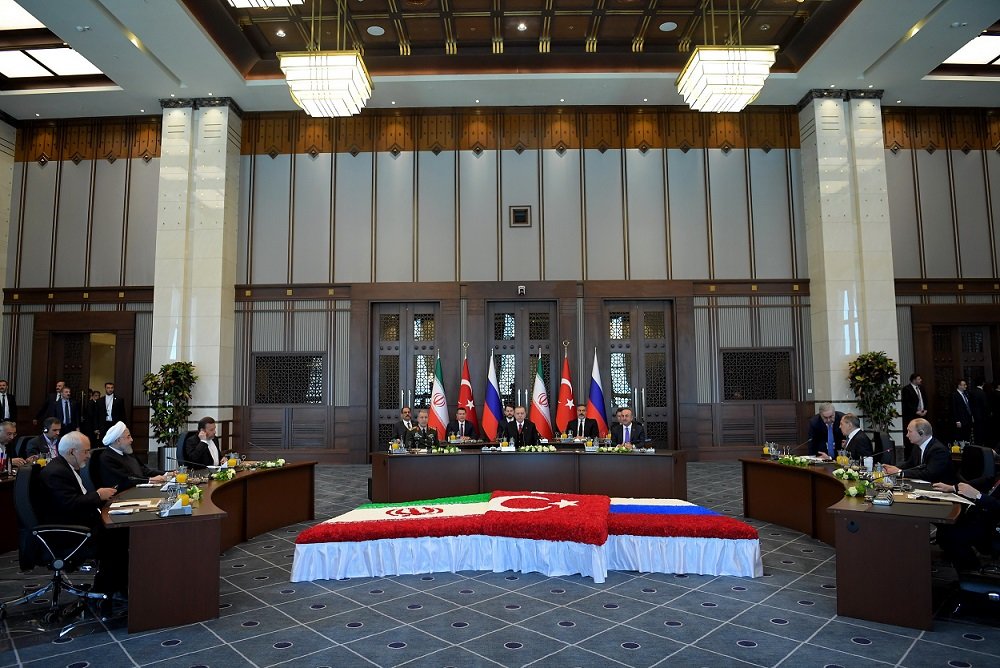Rouhani says there’s no military, foreign-imposed solution to Syria crisis

TEHRAN – President Hassan Rouhani on Wednesday highlighted the importance of the Astana talks in resolving the long-running conflict in Syria, saying there’s no military, foreign imposed solution for the crisis.
Rouhani made the remarks at a trilateral summit on Syria in Ankara. The other key guests of the high-level meeting were Russian President Vladimir Putin and Turkish President Recep Tayyip Erdogan as the host.
Earlier, Rouhani was welcomed by Erdogan at the presidential complex in the Turkish capital, where they held a closed-door meeting ahead of the summit.
During his speech at the summit, Rouhani said, “Real attempt to put an end to the Syrian crisis and creating the required groundwork for reconstruction of this country and providing the groundwork for the return of the refugees to their living place must be emphasized by the three countries and the global community.”
“About 15 months ago, Iran, Russia and Turkey shaped the Astana (peace) process in order to have further success in the fight against terrorism, to combat religious and ethnic differentiation, to shut down the flames of conflict and finally bring about a comprehensive peace in Syria, and have seriously pursued it since then,” Rouhani explained.
Pointing to efforts aimed at reducing tension between warring sides in Syria, the president said the establishment of the four de-escalation zones in Syria have succeeded to reduce conflicts in various parts of the country, help settle a major segment of the Syrian population and strengthen the will of the opposing Syrian parties “to stop the conflict”.
On the key role of Iran, Russia and Turkey in ensuring the Astana peace talks, he said, “If the three countries had not had the necessary coordination, and if the Syrian government had not cooperated properly with the Astana process, we would have now faced a much more complex situation in Syria.”
“So today,” Rouhani said, “in order to complete this process, we must continue our efforts to establish peace and stability in Syria. Certainly, the valuable role of the Astana process has created a good atmosphere for the United Nations to play its role in this regard.”
“Although some governments have been sabotaging the Astana process since the beginning, international initiatives to resolve the Syrian crisis have, directly or indirectly, benefited from the Astana process, and even some of the provisions of the Security Council had already been coordinated by the three guarantors in the Astana process,” he stated.
Rouhani added, “Although ISIL, al-Nusra and other terrorist groups have been seriously undermined and are on the brink of destruction, but unfortunately, some have continued to arm and use them, and have enabled terrorists to make their brutal acts against the Syrian people, including the residents of Damascus.”
The Iranian president also called on all countries to respect the Syrian independence and sovereignty.
“Some countries, including America, support terrorist groups like ISIL in Syria, which serve these countries’ interests... Iran believes the Syrian crisis has no military solution and safeguarding independence of Syria is a priority for Tehran,” Rouhani remarked.
-----Iran, Russia, Turkey presidents’ joint statement
At the end of their summit, the presidents of the Iran, Russia and Turkey issued a joint statement emphasizing that the Astana peace process had been the only effective international initiative that had helped reduce violence across Syria, contributed to peace and stability in the country, and giving impetus to the Geneva process in order to find a lasting political solution to the Syrian conflict.
According to the statement, the presidents expressed their satisfaction with the outcomes of the first year of the Astana meetings held since January 2017.
The presidents of Iran, Russia and Turkey express their strong and continued commitment to the sovereignty, independence, unity, territorial integrity and non-sectarian character of Syria.
They also emphasized their strong and continued commitment to the sovereignty, independence, unity, territorial integrity and non-sectarian character of Syria.
MH/PA
